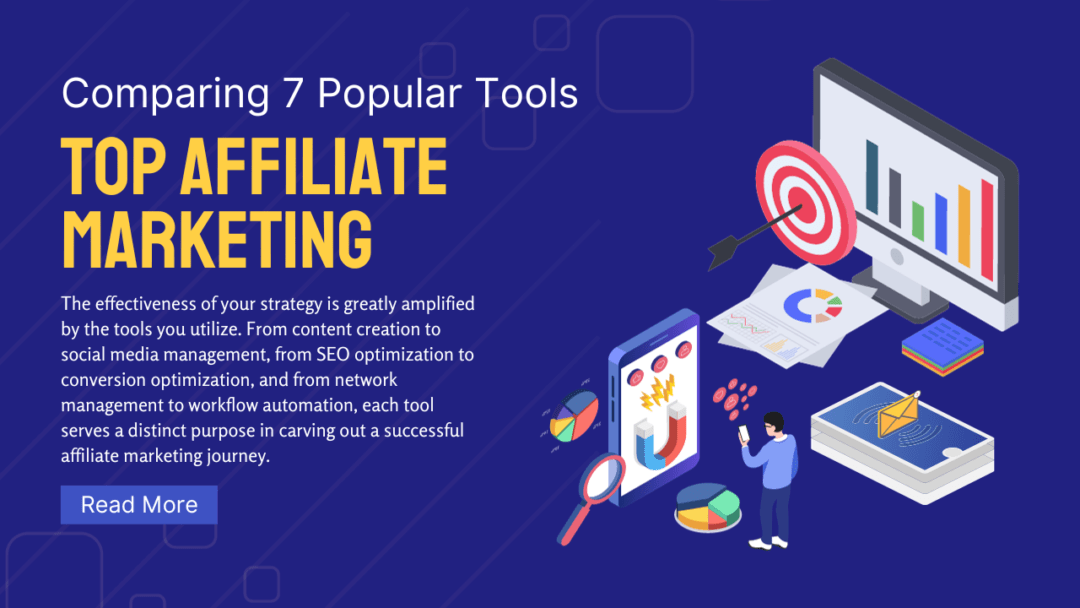Top Affiliate Marketing: Comparing 7 Popular Tools
Affiliate marketing is a booming industry that offers a wealth of opportunities for those who know how to navigate its waters. The essence of top affiliate marketing lies in promoting products or services and earning commissions for successful referrals. But success in this field isn’t just about choosing the right products; it’s equally about selecting the best tools to enhance and streamline your marketing efforts.
In this comprehensive guide, we’ll compare popular affiliate marketing tools across various categories, including email marketing, SEO, content creation, and more. Each tool will be scrutinized for its functionality, usability, and effectiveness, helping you make an informed decision for your affiliate marketing strategy.
Whether you’re just starting out or looking to upgrade your toolkit, this post will serve as your roadmap to finding the tools that will best fit your needs. Let’s dive in and explore the world of affiliate marketing tools, one click at a time.

Email Marketing Tools
Email marketing remains one of the most effective channels for affiliate marketing, offering a direct line of communication with potential customers. It’s not just about sending emails; it’s about sending the right emails to the right people at the right time. This section delves into the nuances of email marketing tools, breaking down their functions and benefits into four key areas.
1. Autoresponders
Definition and Importance
An autoresponder is a sequence of email messages that are automatically sent to subscribers in a specific order at specific intervals. These are essential for nurturing leads, delivering consistent content, and automating part of the customer journey.
Top Choices and Features
- MailChimp: Known for its user-friendly design and robust analytics.
- AWeber: Offers extensive autoresponder capabilities with great customer service.
- GetResponse: Stands out for its automation workflows and conversion funnel features.
Real-world Usage Examples
Imagine a fitness influencer using MailChimp to send a welcome series educating new subscribers about nutrition, followed by personalized workout tips, culminating in exclusive offers for fitness gear.
2. List Management
How to Manage Subscriber Lists
Good list management ensures that the right emails reach the right segment of your audience. It involves organizing subscribers based on demographics, behavior, and preferences.
Tools for Effective List Management
- Constant Contact: Offers easy-to-use list segmentation.
- Campaign Monitor: Provides advanced list management features with a clean interface.
- Brevo: Combines email campaigns with SMS messages and list segmentation.
Practical Tips and Tricks
For instance, segmenting your list by location can help a travel blogger send targeted deals for flights and accommodations, increasing the relevance and performance of their email campaigns.
3. Analytics and Reporting
Understanding Your Audience Through Data
Analytics in email marketing help you understand how subscribers interact with your emails, providing insights into what works and what doesn’t.
Email Marketing Analytics Tools
- HubSpot: Offers comprehensive analytics integrated with a full marketing suite.
- Klaviyo: Focuses on e-commerce businesses with data-rich email analytics.
- Drip: Provides deep insights into customer journeys with their analytics tools.
Case Studies
An online retailer could use Klaviyo to track which products get the most clicks and conversions from their emails, using this data to tailor future promotions.
4. Email Design Tools
Crafting Eye-Catching Emails
The design of your email greatly impacts engagement. Tools that offer templates and easy design interfaces can significantly improve the quality of your campaigns.
Tools for Designing Emails
- Canva: With its drag-and-drop editor, it’s great for creating visually appealing email graphics.
- BEE Free: Provides responsive email templates that look good on all devices.
- Stripo.email: Offers an HTML email template editor for more customization.
Creative Design Examples
A food blogger might use Canva to create a mouth-watering visual menu for their meal-prep guide, leading to higher engagement and click-through rates.
Through these tools, affiliate marketers can create, send, manage, and analyze email campaigns that are not only effective but also scalable. Using these tools wisely can lead to increased engagement, conversions, and ultimately, revenue.

SEO Tools for Affiliate Marketers
Search Engine Optimization (SEO) is the backbone of any successful affiliate marketing strategy. By optimizing for search engines, affiliate marketers can ensure that their content reaches a wider audience organically. This section explores the key SEO tools that can help affiliate marketers enhance their online presence and drive targeted traffic to their affiliate products.
1. Keyword Research
The Role of Keywords in Affiliate Marketing
Keywords are the phrases and terms that potential customers use to search for products and services online. For affiliate marketers, identifying the right keywords is crucial as it aligns their content with the users’ search intent.
Tools for Finding the Right Keywords
- Google Keyword Planner: A free tool that provides keyword ideas and traffic estimates to help you build a strong keyword list.
- SEMrush: Offers in-depth keyword research, competitive analysis, and SEO audits.
- Ahrefs: Known for its massive database of keywords and its ability to find low-competition keywords.
- Sitechecker: Get free access to Sitechecker features including: Scan the site for 300+ technical issues, Monitor your site health 24/7, Track website rankings in any geo, Access the full SEO data dashboard, Track all backlinks in one place.
Keyword Research Strategies
Effective keyword research strategies include focusing on long-tail keywords, which are more specific and less competitive, and looking at competitors’ keyword strategies to find gaps and opportunities.
2. On-Page SEO
Optimizing Affiliate Content for Search Engines
On-page SEO involves optimizing individual web pages in order to rank higher and earn more relevant traffic in search engines. It includes optimizing title tags, content, URLs, and meta descriptions.
On-Page SEO Tools
- Yoast SEO: A popular WordPress plugin that helps you optimize your content for keywords, readability, and consistency.
- Moz Pro: Provides a page optimization tool that gives actionable recommendations.
- Screaming Frog: A desktop program that crawls website links, images, and codes to identify on-page SEO issues.
On-Page Optimization Techniques
Some techniques include using primary keywords in titles and headers, ensuring content answers user queries, and using internal linking to keep users engaged and to distribute page authority throughout your site.
3. Off-Page SEO
Building Authority with Off-Page SEO
Off-page SEO refers to actions taken outside of your own website to impact your rankings within search engine results pages (SERPs). This primarily involves link building.
Tools for Link Building and Outreach
- BuzzStream: Helps you manage your link building and influencer outreach efforts.
- Majestic SEO: Provides a collection of link analysis tools.
- Linkody: Monitors your backlinks and helps in analyzing and tracking link building campaigns.
Success Stories
Case studies often show how using these tools for guest posting, broken link building, and monitoring competitor’s backlinks can lead to a significant increase in traffic and SERP rankings.
4. Technical SEO
Ensuring Your Site’s Health
Technical SEO is about improving the technical aspects of a website in order to increase the ranking of its pages in the search engines. It includes site speed, mobile-friendliness, indexing, and crawlability.
Technical SEO Tools
- Google Search Console: Offers insights into how Google views your site and where improvements can be made.
- Lumar: Crawls your website to find and monitor technical issues.
- Sitebulb: A desktop website crawler that provides insights into your website’s technical SEO health.
Technical SEO Best Practices
Best practices include using secure and accessible websites, having a clear URL structure, optimizing robots.txt to ensure search engines are crawling your site efficiently, and using schema markup to help search engines understand your content better.
Investing time and resources into SEO tools and strategies is vital for affiliate marketers. By leveraging these tools, marketers can gain insights into their performance, stay ahead of SEO trends, and continue to refine their strategies to better target their audiences. This leads to better rankings, more traffic, and ultimately, higher affiliate sales.

Content Creation Tools
Content is the currency of affiliate marketing, and creating engaging, valuable, and persuasive content is key to a successful affiliate strategy. The right content creation tools can streamline the process, enhance quality, and ensure that content resonates with the target audience. This section provides an in-depth look at the tools that can help affiliate marketers excel in content creation.
1. Content Research
Finding Content Ideas That Sell
Content research is about identifying topics that not only attract attention but also have the potential to lead to conversions. This involves understanding market trends, audience needs, and content gaps.
Tools for Content Research
- BuzzSumo: Allows you to analyze what content performs best for any topic or competitor, giving you insights into the most shared and engaging content.
- AnswerThePublic: Offers visualizations of search questions and prompts revolving around specific keywords, helping you understand what your audience is searching for.
- Google Trends: Helps you see the latest trends, data, and visualizations from Google, which is invaluable for content ideation and planning.
How to Use Content Research Tools
Using these tools effectively means looking beyond the obvious keywords and diving into related questions, comparisons, and topics that offer unique angles and untapped potential.
2. Content Writing and Editing
Writing Content That Converts
The core of affiliate marketing content is its ability to persuade and convert readers. Content needs to be informative, engaging, and trustworthy to lead readers towards making a purchase.
Tools for Writing and Editing
- Grammarly: Assists in eliminating grammatical errors and enhancing language style, which is crucial for maintaining professionalism in your content.
- Hemingway Editor: Helps make your writing bold and clear by highlighting complex sentences and suggesting simpler alternatives, which can improve readability.
- Scrivener: A powerful content-generation tool for long documents, which is ideal for managing complex writing projects with various moving parts.
Writing Tips for Affiliate Marketers
Effective writing tips include focusing on benefits over features, using persuasive calls-to-action (CTAs), and incorporating storytelling to make the content more relatable and memorable.
3. Multimedia Content Tools
Enhancing Content with Images and Videos
Incorporating multimedia elements like images, videos, and infographics can significantly improve engagement and help illustrate points more effectively.
Tools for Creating Multimedia Content
- Canva: Provides templates and design elements to create high-quality images and graphics without needing a background in graphic design.
- Adobe Express: Offers tools for creating graphics, web pages, and short videos in minutes.
- Lumen5: A video creation platform that enables you to turn blog posts into engaging videos with relative ease.
- InVideo: Make videos easily by giving a prompt to Invideo AI. Ideal for content creators, YouTubers and marketers, invideo AI offers a seamless way to turn your ideas into publish-ready videos with AI.
Multimedia Content Success Stories
For example, an affiliate marketer could use Lumen5 to convert a successful blog post into a video, thus tapping into video marketing’s high engagement rates and sharing it on platforms like YouTube and social media.
4. Content Management Systems (CMS)
Choosing the Right CMS for Affiliate Marketing
A CMS helps affiliate marketers manage and publish content efficiently without needing extensive technical knowledge. It’s crucial for keeping content organized, updated, and relevant.
Popular CMS Tools
- WordPress: The most popular CMS in the world, known for its flexibility and vast ecosystem of themes and plugins.
- Joomla: Offers a balance between ease-of-use and extensibility, providing a good platform for those with some technical skills.
- Drupal: Known for its powerful taxonomy and ability to handle complex content relationships, suitable for more advanced users.
CMS Case Studies
Using WordPress, an affiliate marketer can easily integrate a blog with an online store, utilize SEO plugins to optimize content, and manage all affiliate links with dedicated plugins.
The tools highlighted in this section are critical for creating, managing, and optimizing content for affiliate marketing. High-quality content that is well-researched, well-written, and well-presented can attract and engage the audience, build trust, and lead to higher conversion rates, making the content creation process a pivotal aspect of affiliate marketing.

Social Media Marketing Tools
Social media has become an essential platform for affiliate marketers to connect with their audience, increase brand visibility, and drive traffic to their affiliate products. Utilizing the right social media marketing tools can help marketers manage their campaigns more efficiently, track performance, and engage with their audience effectively. This section covers the tools that are indispensable for leveraging social media in affiliate marketing.
1: Social Media Management
Managing Multiple Platforms
Social media management involves overseeing all aspects of a marketer’s social media presence across various platforms. It’s not just about posting content but also about scheduling, analyzing, and engaging with the community.
Tools for Social Media Management
- Hootsuite: Enables you to manage multiple social media profiles, schedule posts in advance, and track social media traffic.
- Buffer: Known for its simplicity, Buffer allows you to schedule posts, analyze performance, and manage all your accounts from one place.
- Sprout Social: Offers comprehensive tools for scheduling, monitoring, and reporting, as well as features for social listening and engagement.
Social Media Management Success Stories
A travel affiliate marketer could use Sprout Social to schedule a series of posts across different time zones, ensuring that their content reaches travelers worldwide at optimal times.
2. Social Analytics
Measuring Your Social Media Impact
Social analytics tools measure the effectiveness of social media campaigns, providing insights into engagement, reach, and conversion rates.
Analytics Tools for Social Media
- Google Analytics: While not exclusively for social media, it can track the performance of social media campaigns by monitoring referral traffic to your website.
- Keyhole: Tracks hashtag performance and offers real-time analytics to monitor campaign engagement and reach.
- Brand24: Provides social media monitoring and analytics to track your brand’s online presence and audience engagement.
Analyzing Social Media Performance
For example, using Keyhole, an affiliate marketer can track the performance of campaign-specific hashtags to determine which campaigns are generating the most engagement and conversions.
3. Social Media Advertising
Paid Advertising on Social Platforms
Social media advertising tools help create, manage, and optimize paid campaigns on social platforms to increase reach and target specific demographics.
Tools for Social Media Advertising
- Facebook Ads Manager: For creating and managing ads on Facebook and Instagram, with detailed targeting options and performance tracking.
- Twitter Ads: Allows you to run sponsored tweets and campaigns to reach a larger or more targeted audience.
- LinkedIn Ads: Best for B2B affiliate marketers looking to reach professionals and decision-makers in specific industries.
Advertising Campaign Examples
An affiliate marketer promoting business software might use LinkedIn Ads to target company executives by job title, industry, and company size, leading to higher-quality leads.
4. Engagement and Community Building
Building a Loyal Following
Engagement tools help in interacting with the audience, building relationships, and fostering a community around your brand or niche.
Tools for Increasing Engagement
- MeetEdgar: Automates your social media engagement by resharing your best content over time.
- Mention: Monitors the web and social media for mentions of your brand, allowing you to engage with users who are talking about your products or services.
- Discord: A platform that can be used to create community spaces where affiliate marketers can engage in real-time discussions with their audience.
Community Building Case Studies
A beauty affiliate marketer could use Mention to track where their brand is being discussed online, allowing them to directly engage with potential customers and address any questions or concerns.
Social media marketing tools streamline the complex task of managing multiple platforms and campaigns. They allow affiliate marketers to maintain a consistent presence online, engage with their audience meaningfully, and optimize their social media strategies for better results. By leveraging these tools, affiliate marketers can enhance their reach, build a loyal community, and drive more targeted traffic to their affiliate offers.

Conversion Optimization Tools
Conversion optimization is a critical component of affiliate marketing, focusing on converting a higher percentage of visitors into actionable leads or customers. The right set of tools can help you test, analyze, and improve your conversions, which is essential for maximizing the return on your affiliate marketing efforts. This section explores the tools that can help affiliate marketers fine-tune their funnels for better conversion rates.
1. Landing Page Builders
The Power of Landing Pages
A landing page is a standalone web page, created specifically for a marketing or advertising campaign. It’s where a visitor lands after they click on a link in an email, or ads from Google, Bing, social media, etc. The purpose of a landing page is to provide a focused experience aimed at converting visitors.
Top Landing Page Builders
- Leadpages: Known for its drag-and-drop builder and a wide array of integrations, Leadpages helps marketers create high-converting landing pages without needing technical skills.
- Unbounce: Offers AI-powered optimization, A/B testing, and dynamic text replacement to personalize landing pages and improve conversions.
- ClickFunnels: Not just a landing page builder, it allows for creating entire sales funnels. ClickFunnels is geared towards guiding visitors through a series of steps towards conversion.
Landing Page Optimization Tips
Tips for optimizing landing pages include having a clear and compelling unique selling proposition (USP), using high-quality images, and including testimonials or reviews to build trust. The call-to-action (CTA) should be obvious and persuasive, prompting the visitor to take the next step.
2. A/B Testing Tools
The Importance of A/B Testing
A/B testing, also known as split testing, is the process of comparing two versions of a webpage or app against each other to determine which one performs better. It’s a method to make data-backed decisions that can lead to improvements in conversion rates.
Tools for A/B Testing
- Optimizely: A platform for experimenting across various channels and devices, allowing marketers to test, learn, and deploy winning digital experiences.
- VWO (Visual Website Optimizer): Enables you to conduct A/B tests with a simple visual editor, making it easy to test changes without needing to know how to code.
- Google Optimize: Integrates with Google Analytics and allows you to run experiments to test different web experiences.
Real-life A/B Testing Examples
For instance, an affiliate marketer might use VWO to test two different headlines on a landing page to see which one leads to more clicks on the affiliate link, directly impacting the number of conversions.
3. Lead Capture Tools
Strategies for Capturing Leads
Capturing leads is about collecting information from visitors — usually through a form — so you can convert them into customers over time. Effective strategies involve offering something of value in exchange for contact information, such as an ebook, a discount code, or a webinar.
Tools to Improve Lead Capture
- Sumo: Provides a suite of tools to help you automatically grow your email list and increase conversions.
- Thrive Leads: A WordPress plugin that allows you to create and design every type of opt-in form, test them, and see action-based reports on how they’re performing.
- ConvertKit: Combines email marketing services with lead capture capabilities, making it a good all-in-one solution for content creators.
Lead Capture Success Stories
An affiliate marketer promoting a course might use ConvertKit to offer a free email-based mini-course. As users sign up, they become leads that can be nurtured towards purchasing the full course.
4. Analytics and Performance Tracking
Measuring Success in Affiliate Marketing
It’s vital to track the performance of your affiliate marketing activities to understand what’s working and what isn’t. Analytics tools can provide insights into user behavior, traffic sources, and conversion paths.
Analytics Tools for Performance Tracking
- Google Analytics: The most widely used web analytics service that tracks and reports website traffic, providing valuable insights into user behavior and conversion data.
- Kissmetrics: Focuses on event-based analytics which can be extremely useful for tracking specific actions taken by visitors that lead to conversions.
- Hotjar: Provides heatmaps, session recordings, and surveys to give a visual understanding of how users are interacting with your site.
How to Analyze Affiliate Campaigns
By using these analytics tools, you can track the entire funnel, from how users find your site to what they click on while there, and how they eventually convert. This data can inform decisions on content updates, design changes, and strategic adjustments.
Leveraging conversion optimization tools is essential for any affiliate marketer looking to increase their earning potential. By understanding user behavior, testing different elements on your site, and tracking performance, you can make data-driven decisions that enhance your affiliate marketing strategies and boost your overall conversions.

Affiliate Networks and Management Tools
Choosing the right affiliate network and management tools is essential for affiliates as it can greatly impact their ability to track, manage, and optimize their campaigns. These tools and platforms provide a crucial infrastructure for managing affiliate relationships, tracking sales and commissions, and ensuring compliance. This section examines the tools and networks that play a pivotal role in the affiliate marketing ecosystem.
1. Choosing an Affiliate Network
What to Look for in an Affiliate Network
When selecting an affiliate network, marketers should evaluate the network’s reputation, the variety and quality of available products, the level of support provided, payment structures, and the technology used for tracking and reporting.
Comparison of Popular Networks
- ShareASale: A large network with a broad range of products, known for its reliable tracking technology and regular, timely payments.
- Commission Junction (CJ) by Conversant: Renowned for its extensive network of advertisers, providing affiliates with numerous options for partnerships.
- ClickBank: Specializes in digital products and offers high commission rates, making it a favorite for many digital content affiliates.
Deciding on the Right Network for You
An affiliate’s choice will depend on their niche, the types of products they want to promote, and the specific features they need, such as payment thresholds, reporting tools, and market presence.
2. Affiliate Tracking Software
Tracking Your Affiliate Links
Affiliate tracking software is essential for monitoring the performance of affiliate links, tracking conversions, and attributing sales to the right sources.
Software Options for Link Tracking
- Post Affiliate Pro: Offers robust tracking options, a user-friendly interface, and a variety of plug-ins for integration with other platforms.
- Impact: Provides a partnership cloud that allows you to manage all types of partnerships, with detailed tracking and robust attribution models.
- TUNE: A flexible SaaS platform for building, managing, and growing partner programs and networks.
Tracking Software Case Studies
For example, a marketer using Impact could track not just which links are generating sales, but also identify the customer journey across devices and platforms, helping to optimize for multi-touch attribution.
3. Compliance and Fraud Detection
Staying Compliant in Affiliate Marketing
Compliance in affiliate marketing is about adhering to regulations and guidelines, such as disclosing affiliate relationships and avoiding deceptive marketing practices.
Tools for Compliance and Fraud Detection
- BrandVerity: Monitors affiliate activities to ensure they comply with brand guidelines and regulations.
- Forensiq: Provides fraud detection and prevention to help you combat fraudulent affiliate activities and protect your marketing investments.
- Affise: Offers real-time fraud detection alongside affiliate management features.
Avoiding Pitfalls in Affiliate Marketing
Using these tools, affiliates can automatically monitor for compliance issues, such as undisclosed affiliate links or non-compliant partners, reducing the risk of penalties and maintaining brand integrity.
4. Relationship Management Tools
Maintaining Relationships with Partners
Strong relationships with merchants and affiliate partners are key to long-term success. Relationship management tools help affiliates communicate effectively, resolve issues, and grow their networks.
Tools for Affiliate Relationship Management
- PartnerStack: Focuses on building and nurturing partnerships between affiliates and product owners, with features that support communication and performance incentives.
- AffiliateWP: A WordPress plugin that provides a complete affiliate management system, making it easy to manage affiliates directly from your website.
- Refersion: Manages, tracks, and grows your affiliate network with an easy-to-use interface and powerful tracking capabilities.
Relationship Management Best Practices
The best practices include regular communication, transparent sharing of performance data, and providing partners with the resources they need to succeed, such as promotional materials and product training.
In conclusion, the landscape of affiliate networks and management tools is diverse and offers a range of options tailored to different needs. The right choice of network and management tools can streamline the affiliate marketing process, enhance efficiency, and drive performance. Effective use of these tools ensures robust tracking, better compliance, optimized campaigns, and strong relationships with partners, which are all fundamental to successful affiliate marketing.

Integrations and Automation
In the world of affiliate marketing, efficiency and scalability are key to success. Integrations and automation allow affiliate marketers to streamline their operations, reduce repetitive tasks, and focus on strategy and growth. This section explores the tools and methods that enable powerful integrations and automation in affiliate marketing, ensuring marketers can work smarter, not harder.
1. API Integrations
Streamlining Your Tools with APIs
APIs (Application Programming Interfaces) are sets of protocols that allow different software platforms to communicate with each other. They enable affiliate marketers to integrate various tools and services, creating a cohesive marketing ecosystem.
Tools That Offer API Integration
- Zapier: Acts as a middleman that connects over 2,000 web services and allows for creating workflows between your favorite apps and services without the need for coding skills.
- IFTTT (If This Then That): Enables you to create conditional statements, called applets, which automate actions between different web services and devices.
- Make.com: A more advanced tool that provides visual representation of workflows and allows for complex automation and data manipulation.
API Integration Examples
An affiliate marketer might use Zapier to integrate their email marketing software with their CRM, automating the process of adding new leads from their landing pages directly to targeted email campaigns.
2. Automation Tools
Automating Your Affiliate Tasks
Automation tools can take care of routine tasks such as posting content, managing emails, and analyzing data, freeing up time for more strategic activities.
Tools for Marketing Automation
- HubSpot: Provides a suite of tools for inbound marketing, sales, and CRM, with strong automation features to nurture leads and analyze business metrics.
- ActiveCampaign: Combines email marketing, automation, sales automation, and CRM for a comprehensive marketing automation solution.
- Mailchimp: While known for email marketing, it also offers automation features that can send transactional emails, targeted campaigns, and more based on user behavior.
Automation Success Stories
For instance, an affiliate marketer might use ActiveCampaign to set up an automated email sequence that triggers whenever a user clicks on a specific affiliate link, providing them with additional information and personalized product recommendations.
3. CRM Tools for Affiliates
Managing Your Contacts and Leads
CRM (Customer Relationship Management) tools help affiliate marketers keep track of their leads, manage relationships, and analyze customer interactions and data throughout the customer lifecycle.
CRM Tools in Affiliate Marketing
- Salesforce: Offers a robust CRM solution with capabilities that can be customized for affiliate marketing needs.
- Pipedrive: A sales-focused CRM that visualizes your sales pipeline and helps manage leads and deals effectively.
- Zoho CRM: Provides a suite of online productivity tools and SaaS applications, including a strong CRM platform with automation capabilities.
CRM Implementation Stories
A marketer might use Zoho CRM to segment leads based on the affiliate products they showed interest in, tailor follow-up communications, and track the effectiveness of different affiliate campaigns.
4. Workflow Optimization Tools
Enhancing Productivity and Efficiency
Workflow optimization tools help in creating and managing a marketer’s workflow, ensuring tasks are performed efficiently and consistently, leading to increased productivity.
Tools to Optimize Your Workflow
- Asana: A task management tool that helps teams coordinate and manage their work with project boards, timelines, and other collaborative features.
- Trello: Uses boards, lists, and cards to help organize and prioritize your projects in a flexible and rewarding way.
- Monday.com: A Work Operating System (Work OS) that powers teams to run projects and workflows with confidence.
Workflow Optimization Techniques
An affiliate marketer could use Monday.com to manage their content calendar, track the status of different pieces of content, and ensure that promotional activities are aligned with product launches or seasonal trends.
Integrations and automation are transformative in the realm of affiliate marketing, providing a seamless flow of data between tools and automating repetitive tasks. This allows marketers to concentrate on optimizing their campaigns and scaling their efforts. Effective use of these tools can lead to more personalized marketing, timely engagement with leads, and ultimately, higher conversion rates. By embracing the power of integrations and automation, affiliate marketers can significantly enhance their productivity and effectiveness.
Conclusion of Top Affiliate Marketing
The effectiveness of your strategy is greatly amplified by the tools you utilize. From content creation to social media management, from SEO optimization to conversion optimization, and from network management to workflow automation, each tool serves a distinct purpose in carving out a successful affiliate marketing journey. The exploration of these tools in this guide provides a comprehensive understanding of how to harness their capabilities to create an efficient and impactful affiliate marketing strategy.
Key Takeaways
- Email Marketing Tools are fundamental for nurturing leads and automating customer journeys.
- SEO Tools enhance your online presence and drive targeted, organic traffic to your affiliate offers.
- Content Creation Tools are critical for producing engaging, high-quality content that converts.
- Social Media Marketing Tools allow for efficient management of multiple platforms and help in engaging with a broad audience.
- Conversion Optimization Tools are essential for turning visitors into leads and customers through data-driven decisions.
- Affiliate Networks and Management Tools provide the necessary infrastructure for tracking, managing, and optimizing affiliate campaigns.
- Integrations and Automation Tools streamline operations, allowing affiliates to focus on growth and strategy.
By understanding and implementing the right tools in each of these categories, affiliates can expect to see an improvement in their campaign effectiveness, operational efficiency, and ultimately, their bottom line.
FAQs
1. What are the best practices for using email marketing tools in affiliate marketing?
The best practices include segmenting your email list for targeted campaigns, personalizing emails for higher engagement, utilizing autoresponders for lead nurturing, and regularly reviewing analytics to optimize your strategies.
2. How often should I perform SEO audits on my affiliate site?
It is recommended to perform an SEO audit quarterly. However, if you’re making significant changes to your site or updating content frequently, you may want to conduct audits more regularly to identify and address issues promptly.
3. Can automation tools replace the need for personal engagement in social media?
No, automation tools are meant to complement personal engagement, not replace it. They can handle routine tasks, but genuine, personal interactions are essential for building trust and relationships with your audience.
4. Is it necessary to have a background in design to create engaging content?
Not necessarily. Many content creation tools offer templates and intuitive interfaces that help users create professional-looking graphics and multimedia content without any design skills.
5. How do I choose the right affiliate network for my niche?
Consider the products or services that align with your niche, research each network’s merchants, evaluate commission structures, and read reviews or case studies. It’s also crucial to choose networks with robust tracking and support services.
Photo by Pexels

















